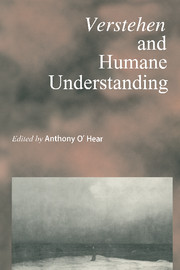Book contents
- Frontmatter
- Contents
- Notes on Contributors
- Preface
- ‘Two Cultures’ Revisited
- Rational and Other Animals
- Vico and Metaphysical Hermeneutics
- Three Major Originators of the Concept of Verstehen: Vico, Herder, and Schleiermacher
- Weber's Ideal Types as Models in the Social Sciences
- Verstehen, Holism and Facism
- Interpretation in History: Collingwood and Historical Understanding
- The Meaning of the Hermeneutic Tradition in Contemporary Philosophy
- Science and Psychology
- To Mental Illness via a Rhyme for the Eye
- Can There be an Epistemology of Moods?
- Feeling and Cognition
- Believing in order to Understand
- Data and Theory in Aesthetics: Philosophical Understanding and Misunderstanding
- Anti-Meaning as Ideology: The Case of Deconstruction
- Perictione in Colophon
- Index of Names
Perictione in Colophon
Published online by Cambridge University Press: 17 May 2010
- Frontmatter
- Contents
- Notes on Contributors
- Preface
- ‘Two Cultures’ Revisited
- Rational and Other Animals
- Vico and Metaphysical Hermeneutics
- Three Major Originators of the Concept of Verstehen: Vico, Herder, and Schleiermacher
- Weber's Ideal Types as Models in the Social Sciences
- Verstehen, Holism and Facism
- Interpretation in History: Collingwood and Historical Understanding
- The Meaning of the Hermeneutic Tradition in Contemporary Philosophy
- Science and Psychology
- To Mental Illness via a Rhyme for the Eye
- Can There be an Epistemology of Moods?
- Feeling and Cognition
- Believing in order to Understand
- Data and Theory in Aesthetics: Philosophical Understanding and Misunderstanding
- Anti-Meaning as Ideology: The Case of Deconstruction
- Perictione in Colophon
- Index of Names
Summary
The following extract comes from a recently discovered Xanthippic dialogue, which tells the story of Archeanassa's return to her native Colophon. Archeanassa travelled, it appears, as the emissary of Plato, who had instructed her to recover the manuscripts of the poet Antimachus, ostensibly for the library of the Academy, but in all probability to take revenge on the poet by burning his literary remains. (See Phryne's Symposium, 1176a, for an account of the distressing relationship between these three people.) The dialogue exists only in fragments: some concern Archeanassa's adventures on the journey, others describe the city of Colophon, now a Persian administrative centre, its Greek culture extinguished, its temples in ruins, and its streets darkened by high-rise buildings. The inhabitants visit the town either for work, or for the girls who dance in the night-clubs. One such girl is Perictione, grand-daughter of the great Perictione, whose talent as a dancer would have been famous throughout Hellas, had not her son Plato done his utmost to conceal it. How Perictione the younger came to Colophon the dialogue does not tell, although it seems that she lived well and independently, was a leading member of the Greek community, and retained the interest in philosophy which had been awakened at Phryne's symposium.
In her efforts to find the manuscripts of Antimachus (including an early version of the famous Lyde which she too wished to destroy) Archeanassa is led to Perictione, with whom she discusses many topics besides their circle of Athenian friends.
- Type
- Chapter
- Information
- Verstehen and Humane Understanding , pp. 287 - 308Publisher: Cambridge University PressPrint publication year: 1997



